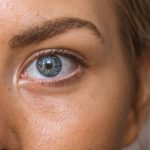How Does Blue Light Damage Eyes?
Blue light is an unavoidable part of modern life, but does blue light damage eyes? Both natural sunlight and artificial light penetrate deeply into our eyes. Blue light impacts eye health in a few ways leading to eyestrain and premature eye damage.
Educating yourself about blue light offers the opportunity to develop eye-friendly habits and to protect your vision.
The following guide is strictly for educational purposes and is not a substitute for medical and professional care. Your eye care professional can offer more specific information that is custom tailored to your individual needs.
What is Blue Light?
Blue light naturally comes from sunlight. The sun’s light contains a mixture of red, orange, yellow, green, blue, indigo and violet light. The white light we see comes from a combination of these colors.
Each color affects our eyes a little differently. For example, red light has longer wavelengths and less energy. On the other hand, blue light has shorter wavelengths and more energy.
Blue light is healthy to a certain point. Benefits of blue light include:
- It regulates circadian rhythm or our body’s natural sleeping and waking cycle clock.
- Blue light is credited with boosting alertness, lifting moods, and it may even help memory.
- Research indicates children need blue light to develop eyes and vision. Some studies hint that lack of blue light exposure might result in nearsightedness among children.
A healthy balance of blue light benefits the human body and mind. But does blue light image eyes? The truth is, you can have too much of a good thing.
Negative Effects of Excess Blue Light Exposure:
Most blue light passes through the eye’s lens and cornea until it reaches the retina. It may lead to premature aging of the eyes in some ways similar how UV rays can lead to premature skin aging.
Use of digital devices like smartphones and tablets compounds blue light exposure. LED monitors use blue light, so this affects avid computer users, television watchers, and anyone who spends a lot of time using a phone.
Excess Blue Light Exposure Contributes to:
- Digital eye strain – LED monitors are a common form of blue light exposure. People often stare at their computer or device screen sometimes without resting the eyes or even without blinking. Digital eye strain may involve more than just blue light, however, the intensity of the light is a major factor.
- Retina damage – Over time blue light exposure damages retinal cells.This contributes to or causes vision problems including age-related macular degeneration.
When you ask yourself, “does blue light damage eyes,” there is more to just your eyesight to take into consideration. In addition to eye damage, evidence suggests that modern levels of blue light exposure may disrupt natural sleeping and waking cycles. Sleep is essential for optimal health — including eye health.
Sources of Blue Light Exposure:
Blue light is everywhere since the sun is the largest source. However, the digital age increases blue light exposure. Common sources of blue light include:
- Sunlight
- Fluorescent light or CFL (compact fluorescent light) bulbs
- LED Flat screen televisions
- LED light
- Computer monitors,
- Smartphones, and tablet screens
An average person might light their home with energy saving LED bulbs, work in an office under fluorescent lights, and spend hours each day looking at their computer monitor or smartphone. All this extra exposure adds up over the days, weeks, and years.
People may choose to wear sunglasses to protect their eyes from the sun, but how likely are they to protect their eyes from their computer monitor, television, or mobile device? According to a 2016 CNN report, many Americans typically spend ten hours a day looking at screens including their computer monitor, television, phone, or tablet.
Tips To Protect Your Eyes
- Control screen time
- Consider blue light filters for your smartphone, illuminated e-reader, or tablet
- Try computer glasses
- Anti-reflective lenses
- Talk with your eye doctor about Intraocular lens
Your diet and nutrition support your eye health. For example, when you were a child did anyone ever tell you that carrots are good for your eyes? Well, they were right. Carrots are rich in beta-carotene, a form of vitamin A.
Carotenoids (including beta-carotene) help plants absorb the light needed for photosynthesis. Humans convert beta-carotene into vitamin A. It also acts as an antioxidant that helps protect us from oxidative damage. Colorful orange or yellow produce like carrots, squash, cantaloupe, and red or yellow peppers provide helpful nutrients like carotenoids.
Beta-carotene is not the only carotenoid that assists with eye health. Lutein and zeaxanthin are carotenoids your eyes use to create the macular pigment that helps shield your eyes from blue light. Unfortunately, many people do not get enough of these nutrients in a typical diet. Supplements offer an opportunity to ensure you feed your eyes these protective nutrients.
Another nutrient that benefits the eyes is omega-3 fatty acids including EPA and DHA. These fatty acids are the building blocks for fats your body needs. The human body uses these essential fats to create and maintain the function of cells, nerves, muscles, and organs. Common dietary sources include oily fish like salmon and mackerel. Vegetarian sources include walnuts and chia seeds. Many people take omega-3 supplements to ensure they consume enough since the human body cannot produce its own essential fatty acids. The term “essential” refers to nutrients we need but are not able to produce, so we need to consume them through diet or supplementation.
Treating Blue Light Damage at Piedmont EyeCare
Piedmont Eye Care is currently running a special on EyePromise Zeaxanthin + Lutein Macular Health supplements. The sale offers 3 Packs for $90. For more information visit Piedmont Eye Care’s supplement page.
Are you interested in finding out does blue light damage eyes? Be sure to see your eye doctor for your regular exams and for guidance on the best ways to protect your vision. A comprehensive plan including professional eye care, a healthy diet, and eye-friendly lifestyle offers the best protection for your vision.





